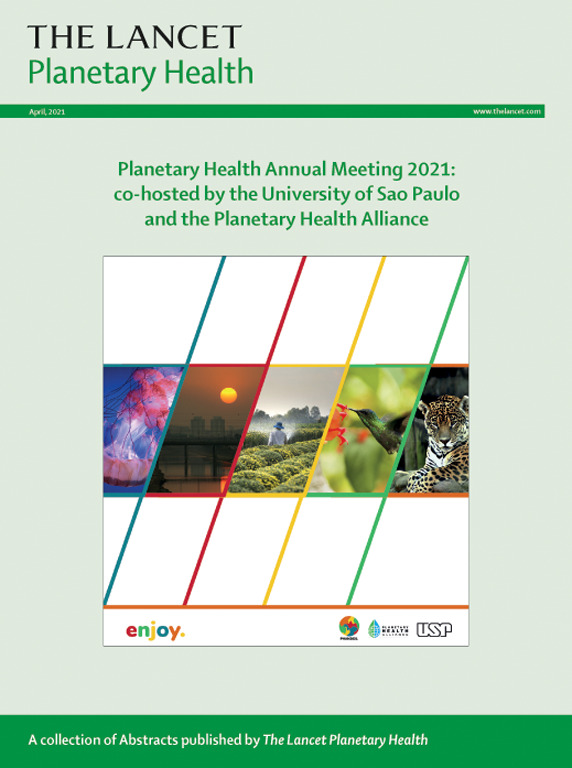在与生活方式相关的气候敏感健康咨询中,健康论与气候和健康论的可接受性:德国一项随机调查实验的结果
IF 21.6
1区 医学
Q1 ENVIRONMENTAL SCIENCES
引用次数: 0
摘要
卫生专业人员提供的气候敏感健康咨询可以促进患者个人和地球健康,特别是在生活方式咨询方面。然而,卫生专业人员对CSHC可接受性的不确定性仍然是实施CSHC的障碍。本研究旨在探讨不同主题和框架对生活方式相关的CSHC患者可接受性的影响。方法:我们进行了一项随机调查实验,采用2 × 3混合因子设计,嵌入在德国健康相关信念和医疗保健经验(HeReCa)小组研究的更大调查中,该小组是德国16个联邦州中5个州的普通成年人的在线小组。参与者以1:1的比例随机分配到两个主题(饮食或体育活动)中的一个,并以随机顺序呈现三个小片段(框架a仅从健康方面提出给定的建议;框架B从健康和气候共同惠益的角度提出了建议;框架(强调健康、气候协同效益和气候风险)。主题是主体间因素,框架是主体内因素。我们假设CSHC的可接受性会因框架而异,但不会因主题而异。主要结果变量是CSHC小插曲的可接受性,使用基于四个项目(情感态度,负担,道德和感知有效性)的可接受性评分来测量,以五点Likert量表评分(1 - 5分:1=不可接受,5=非常可接受)。我们根据政治取向和气候变化态度测试的左右自我定位产生的亚群体改进了我们的假设。我们对全部和分层样本应用描述性统计、t检验和混合方差分析。在2019年11月至2020年6月期间注册参加HeRaCa小组的3346名参与者中,3163名参与者(94.5%)接受了调查,1516名参与者(47.9%)在2022年4月至6月期间提交了回复。排除资料不完整的25名受试者,1491名受试者进行混合方差分析。748名参与者被分配到饮食组,743名参与者被分配到运动组。全部样本的平均年龄为55.6岁(SD 14.2)。排除62名缺失值的参与者,814名(57.0%)为女性,613名(49.2%)为男性;两名参与者(0.1%)自我认同为多元性别。在整个队列中,框架A的平均可接受分为4.09分(SD = 0.71),框架B的平均可接受分为3.67分(SD = 0.91);混合方差分析显示,框架对CSHC可接受性的影响显著且很大(偏η= 0.18, p < 0.01),话题对CSHC可接受性的影响显著但可以忽略不计(偏η= 0.004, p= 0.021)。分层分析显示,在对气候变化感到担忧或政治立场偏左的参与者中,框架效应不那么明显。在所有亚组中,仅健康的CSHC框架比健康和气候框架更容易被接受。在对气候变化持谨慎或怀疑态度的参与者中,分歧最为明显。这些发现突出了CSHC的全球健康目标与患者可接受性之间的紧张关系,这可以通过应用以患者为中心的沟通技术来缓解。资助马丁·路德大学哈雷-维滕贝格。本文章由计算机程序翻译,如有差异,请以英文原文为准。
Acceptability of health-only versus climate-and-health framings in lifestyle-related climate-sensitive health counselling: results of a randomised survey experiment in Germany
Background
Climate-sensitive health counselling (CSHC) delivered by health professionals could promote individual patients and planetary health, particularly within lifestyle counselling. However, health professionals’ uncertainty about the acceptability of CSHC remains a barrier to implementation. This study aimed to establish the effects of different topics and framings on patients’ acceptability of lifestyle-related CSHC.
Methods
We conducted a randomised survey experiment with a 2 × 3 mixed factorial design embedded in a larger survey in the Health-Related Beliefs and Health Care Experiences (HeReCa) panel study in Germany, an online panel of the general adult population from five of the 16 federal states across Germany. Participants were randomly assigned in a 1:1 ratio to one of two topics (either diet or physical activity) and were presented with three vignettes in a random order (framing A framed the given advice in health terms only; framing B presented the advice in terms of health and climate co-benefits; and framing C emphasised health, climate co-benefits, and climate risks). Topic served as the between-subject factor, and framing served as the within-subject factor. We hypothesised that the acceptability of CSHC would differ according to framing, but not according to topic. The primary outcome variable was the acceptability of the CSHC vignettes, measured using an acceptability score based on four items (affective attitude, burden, ethicality, and perceived effectiveness), rated on a five-point Likert scale (1–5 score: 1=not acceptable, 5=very acceptable). We refined our hypotheses based on subpopulations generated from a Left–Right Self-Placement for political orientation and climate change attitude test. We applied descriptive statistics, t tests, and a mixed ANOVA to the full and stratified samples.
Findings
Of 3346 individuals who signed up for the HeRaCa panel between November, 2019, and June, 2020, 3163 participants of the panel (94·5%) were given the survey and 1516 (47·9%) submitted responses between April and June, 2022. 25 participants with incomplete data were excluded, and 1491 participants were included in the mixed ANOVA primary analysis. 748 participants were allocated to the diet group and 743 to the physical activity group. The mean age of the full sample was 55·6 years (SD 14·2). Excluding 62 participants with missing values, 814 (57·0%) were female and 613 (49·2%) were male; two participants (0·1%) self-identified as a diverse gender. In the whole cohort, the mean acceptability score of framing A was 4·09 (SD 0·71), was 3·67 (0·91) for framing B; and was 3·55 (0·97) for framing C. Mixed ANOVA revealed a significant and large effect of framing (partial η=0·18, p<0·001), and a significant but negligible effect of topic (partial η=0·004, p=0·021) on CSHC acceptability. Stratified analysis revealed that framing effects were less pronounced among participants alarmed about climate change or positioned politically to the left.
Interpretation
Health-only framings of CSHC yield greater acceptability than health-and-climate framings across all subgroups. Differences are most pronounced among participants cautious or doubtful about climate change. These findings highlight tensions between the planetary health aims of CSHC and acceptability to patients, which could be alleviated by applying patient-centred communication techniques.
Funding
Martin Luther University Halle-Wittenberg.
求助全文
通过发布文献求助,成功后即可免费获取论文全文。
去求助
来源期刊

Lancet Planetary Health
Multiple-
CiteScore
28.40
自引率
2.30%
发文量
272
审稿时长
8 weeks
期刊介绍:
The Lancet Planetary Health is a gold Open Access journal dedicated to investigating and addressing the multifaceted determinants of healthy human civilizations and their impact on natural systems. Positioned as a key player in sustainable development, the journal covers a broad, interdisciplinary scope, encompassing areas such as poverty, nutrition, gender equity, water and sanitation, energy, economic growth, industrialization, inequality, urbanization, human consumption and production, climate change, ocean health, land use, peace, and justice.
With a commitment to publishing high-quality research, comment, and correspondence, it aims to be the leading journal for sustainable development in the face of unprecedented dangers and threats.
 求助内容:
求助内容: 应助结果提醒方式:
应助结果提醒方式:


